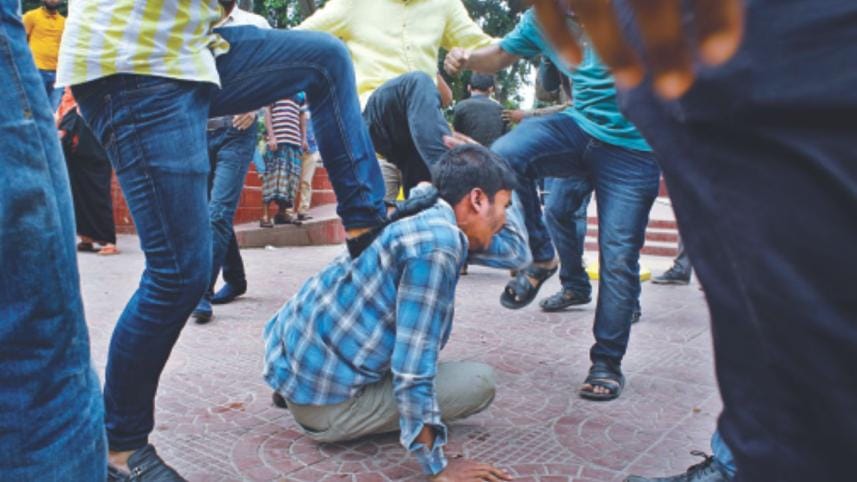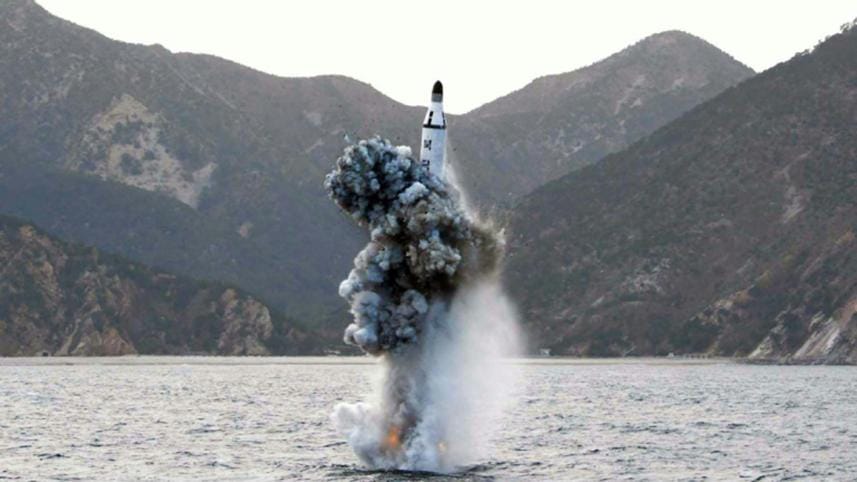Commentary: Why this merciless beating?

For three days now, students demanding quota reform are being mercilessly beaten by Chhatra League activists at various universities across the country. Yesterday, at least two people were detained when a group of concerned citizens and parents gathered before the Jatiya Press Club to protest the assault on their children just for raising a legitimate demand. The detainees -- a former Jahangirnagar University teacher and a former leftist student leader -- were later released. But the question is: Is peacefully expressing concerns for our children not acceptable anymore?
Primarily, as a conscientious citizen and a human being and then as a former student of Dhaka University, a freedom fighter, a student political activist of the sixties and an inheritor of the splendid, enviable and proud legacy of student politics of the DU, I am filled with sorrow and revulsion at the inhuman, uncivilised and horrible treatment being meted out to the students of DU and other universities by the pro-ruling party student activists.
There are many famous student leaders of my days in the current cabinet. During their glory days, they themselves were victimised for their activism. Shouldn't they be concerned to see such denigration of DU students?
They should know better than to allow this mayhem to continue. They know from their own experience that such brutal treatment only hardens the resolve of protesters.
May be there had been similar oppressive actions on students during military or other regimes or governments' tenure. May be BCL activists themselves were at the receiving end of such violence.
But to repeat it in today's world, especially when, under Sheikh Hasina's leadership, Bangladesh is not only making a whole new image for itself but forcing the world to recognise it, is nothing less than throwing dirt on our own face.
Under what law, by what right, is the BCL beating up the students? Why are the police a mere spectator in all this? On Monday, police were seen leaving the Shaheed Minar just as they saw the BCL men coming to attack the protesters. Reportedly, a number of female students were also manhandled and even kicked. Was it a case of law enforcers leaving the ground so the law breakers could have their way?
However, isn't it a fact that:
To attack someone and physically harm him/her is a crime?
To take the law into one's own hands is a crime?
To interfere in police work is a crime?
To abuse someone is a crime?
So what are the police, the home ministry and the government as a whole doing about it?
On the other hand:
Peaceful gathering is a political right;
Holding a protest is a democratic right;
Physical safety is a human right;
Freedom of movement is a civic right.
All of these are our FUNDAMENTAL RIGHTS guaranteed by the constitution and upheld by all the legal instruments applicable nationally and internationally.
To deny any individual or group their constitutional rights is to violate the constitution, and it is the duty of a democratic government, which takes its oath on the constitution, to uphold every principle enshrined in it.

That is of course if we have rule of law in the country. We would like to still believe that we have. We also would like to believe that the ruling party will do everything in its power to end the present disgraceful behaviour by the pro-Awami League student body and that the government will ensure fundamental rights of all.
However, our belief rests on a very weak foundation because:
This is not the first time that the BCL activists have taken the law into their own hands;
This is not the first time that the ruling party activists have physically assaulted those with whom they differ;
This is not the first time peaceful gatherings have been attacked by people claiming to be ruling party supporters;
This is not the first time that peaceful dissent has been silenced through physical assault.
Were the quota reformists breaking the law? No.
Did they resort to violence? No.
Would their holding a press briefing harm the country in any way? No.
Were they indulging in any anti-state activities? No.
Were the issues raised by them contrary to our constitution, democracy or ideals of our Liberation War? No.
Are they citizens of Bangladesh and entitled to basic political and human rights? Yes.
Do our students have a right to raise questions on issues that affect them? Yes.
Did they have a legitimate point to make? Yes.
Why then, we ask again, are they being attacked and arrested?
Is it because the ruling party activists feel that they are above the law?
Is it that breaking the law seldom leads to punishment and sometimes even to rewards?
Is there a deep-seated disregard for legal rights of others, especially if one is a “dissenter”?
The quota reform demand is three months old. The PM responded sympathetically and a committee has been formed to examine what could be done, though initially she wanted to abolish the system altogether.
The issue is extremely important and lies at the core of the quality of our future bureaucracy. There is a fairness issue that tilts us towards affirmative action for the special/disadvantaged groups, and then there is the quality issue that takes merit as the most important criterion.
Policymakers all over the developing world are grappling with this complex problem. But nowhere are the exponents of contrarian views being physically assaulted for days.
The agitating students could have been informed that it will take some more time and that they need to wait for a while. But instead, the BCL activists went on a rampage on them.
We conclude by asking if a nonpartisan students' group agitating for their future job prospects can be attacked so brutality, then what will happen when the opposition tries to hold a public rally to criticise the government?
Can this be the state of our democracy?

 For all latest news, follow The Daily Star's Google News channel.
For all latest news, follow The Daily Star's Google News channel.
Comments